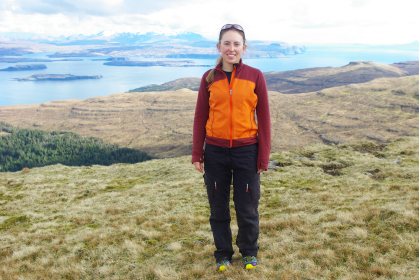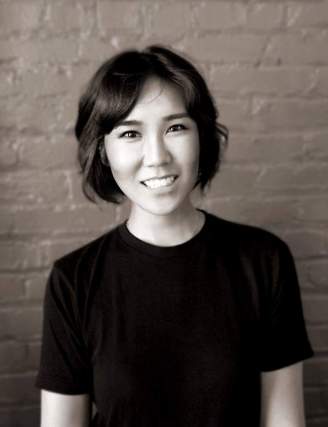 Hi, I’m Katherine and I’m currently Bioinformatics Manager at the Natural History Museum in London. In November, I will be moving to Northumbia University as Vice Chancellors Fellow in Bioinformatics. My research focuses on the analysis and systematic integration of largescale omics data and the development of approaches for the analysis of next generation sequencing data, with a focus on evolutionary genetics.
Hi, I’m Katherine and I’m currently Bioinformatics Manager at the Natural History Museum in London. In November, I will be moving to Northumbia University as Vice Chancellors Fellow in Bioinformatics. My research focuses on the analysis and systematic integration of largescale omics data and the development of approaches for the analysis of next generation sequencing data, with a focus on evolutionary genetics.
I originally studied Molecular Biology as an undergraduate at Newcastle but, due to a lack of jobs in the area at the time and following a disappointing third year project, I spent the next few years outside of science: managing a pub and restaurant (great fun, poor pay), and then working as an administrator for the Civil Service (better pay, mind-numbingly boring).
Eventually my love of biology and computing science led me back to Newcastle to the, then relatively new, MRes Bioinformatics course. I subsequently stayed to do a PhD in Computing Science (during which I was lucky enough to be one of the first Computing Science PhDs in the UK to do laboratory work during my project). As a Post-Doc I worked on a diverse range of project; from data analysis to software and algorithm development, and involving yeast, human and bacterial data, before moving to London to join the NHM.
My current research is very different from the classic “model-organism“-oriented work earlier in my career, and I often refer to it as “I’m a bioinformatician, get me out of here!” If it has DNA, then we want to sequence it; I work with sharks, whales, scallops, tapeworms and a whole host of other invertebrate species. This week I’m looking forward to talking about the changes in bioinformatics over the last few years, and the challenges ahead as we apply bioinformatics algorithms to more diverse species.

 Hi everyone! I’m Sarah and I’m a research associate at the University of Bath, where I work on developing new cancer medicines. It is possible that my takeover of the Biotweeps channel may take the channel closer to the Chemistry-Biology interface than ever before!
Hi everyone! I’m Sarah and I’m a research associate at the University of Bath, where I work on developing new cancer medicines. It is possible that my takeover of the Biotweeps channel may take the channel closer to the Chemistry-Biology interface than ever before! The Minnesota Invasive Terrestrial Plants & Pests Center (MITPPC) is a University of Minnesota research center generating practical, science-based solutions to protect prairies, forests, wetlands and agricultural resources from harm by invasive species. The Center grants funding to faculty working on prioritized invasive insects, weeds and pathogens in the region.
The Minnesota Invasive Terrestrial Plants & Pests Center (MITPPC) is a University of Minnesota research center generating practical, science-based solutions to protect prairies, forests, wetlands and agricultural resources from harm by invasive species. The Center grants funding to faculty working on prioritized invasive insects, weeds and pathogens in the region. Steven is a current PhD candidate at the University of Kent where his research focuses on the population dynamics of the barred grass snake (
Steven is a current PhD candidate at the University of Kent where his research focuses on the population dynamics of the barred grass snake ( Vicky Vásquez is a graduate student under the Pacific Shark Research Center (PSRC) where she studies ‘Lost Sharks’; a term used to described lesser known or undiscovered species of cartilaginous fishes. She also serves as the social media manager to the larger entity, Moss Landing Marine Labs. Vicky combines her outreach efforts with her research as a tool for engaging a broader audience. One such example includes the discovery of the first Lanternshark species off the Pacific coast of Central America. In an effort to excite school age children with the discovery, Vicky reached out to her younger cousins as well as a local San Francisco youth group for suggestions on the name of the new shark species. When the Ninja Lanternshark discovery was made public, the news went viral and was even featured in the comic, Sherman’s Lagoon. In addition, the scientific name, Etmopterus benchleyi, is a nod to Peter Benchley’s often unnoticed contributions towards ocean conservation. Another research highlight from Vicky’s work is being apart of first research team to ever tag a Goblin Shark (Mitzsukurina oswtoni). In some of her past sharky fieldwork, Vicky has worked with Great Whites, Soupfins, Sevengills, Hammerheads, Leopard Sharks, Bay Rays, and Thornback Rays. She uses her work with sharks as a lead into to broader issues affecting the world’s oceans such as plastic pollution and overfishing. Some of Vicky’s other science communication work includes several appearances on Discovery Channel’s Shark Week; co-host of the Ocean Science Radio podcast, freelance writer and public speaker. To follow Vicky’s work, check out her Facebook and Instagram pages with the handle
Vicky Vásquez is a graduate student under the Pacific Shark Research Center (PSRC) where she studies ‘Lost Sharks’; a term used to described lesser known or undiscovered species of cartilaginous fishes. She also serves as the social media manager to the larger entity, Moss Landing Marine Labs. Vicky combines her outreach efforts with her research as a tool for engaging a broader audience. One such example includes the discovery of the first Lanternshark species off the Pacific coast of Central America. In an effort to excite school age children with the discovery, Vicky reached out to her younger cousins as well as a local San Francisco youth group for suggestions on the name of the new shark species. When the Ninja Lanternshark discovery was made public, the news went viral and was even featured in the comic, Sherman’s Lagoon. In addition, the scientific name, Etmopterus benchleyi, is a nod to Peter Benchley’s often unnoticed contributions towards ocean conservation. Another research highlight from Vicky’s work is being apart of first research team to ever tag a Goblin Shark (Mitzsukurina oswtoni). In some of her past sharky fieldwork, Vicky has worked with Great Whites, Soupfins, Sevengills, Hammerheads, Leopard Sharks, Bay Rays, and Thornback Rays. She uses her work with sharks as a lead into to broader issues affecting the world’s oceans such as plastic pollution and overfishing. Some of Vicky’s other science communication work includes several appearances on Discovery Channel’s Shark Week; co-host of the Ocean Science Radio podcast, freelance writer and public speaker. To follow Vicky’s work, check out her Facebook and Instagram pages with the handle  Hi everyone! My name is Dr Lucy Taylor (
Hi everyone! My name is Dr Lucy Taylor ( I’m a PhD candidate in Integrative Biology at the University of Guelph in Guelph, Ontario. My PhD research is interdisciplinary and spans microbiology, bioinformatics (analyzing biological data, for e.g. DNA sequences, using computer science), ecology and chemistry – where I often work collaboratively with chemists. My specialty lies in how plants, fungi and insects interact with one another in tropical ecosystems. I ask questions like; how does plant chemistry affect other organisms in the community? And, what variables are important for determining which fungi colonize the interior of leaves (termed fungal endophytes)? More recently, I’m working on a project that looks at whether digestion of seeds by bats influence fungi the colonize seeds and improve seed germination. This fall, I’ll be going to Brazil to work with a chemist on how these fungal endophytes contribute to the chemistry in plants. You might be wondering, why are these questions important? My work aims to contribute to our understanding of how species interact with one another in a highly diverse and complex ecosystem. This is especially important because of the decline in species diversity in the tropics, due to factors such as deforestation and climate change. There are also potential applications for agriculture, through how plants may defend themselves against enemies and pharmacy by discovering new compounds which may have properties to combat human diseases.
I’m a PhD candidate in Integrative Biology at the University of Guelph in Guelph, Ontario. My PhD research is interdisciplinary and spans microbiology, bioinformatics (analyzing biological data, for e.g. DNA sequences, using computer science), ecology and chemistry – where I often work collaboratively with chemists. My specialty lies in how plants, fungi and insects interact with one another in tropical ecosystems. I ask questions like; how does plant chemistry affect other organisms in the community? And, what variables are important for determining which fungi colonize the interior of leaves (termed fungal endophytes)? More recently, I’m working on a project that looks at whether digestion of seeds by bats influence fungi the colonize seeds and improve seed germination. This fall, I’ll be going to Brazil to work with a chemist on how these fungal endophytes contribute to the chemistry in plants. You might be wondering, why are these questions important? My work aims to contribute to our understanding of how species interact with one another in a highly diverse and complex ecosystem. This is especially important because of the decline in species diversity in the tropics, due to factors such as deforestation and climate change. There are also potential applications for agriculture, through how plants may defend themselves against enemies and pharmacy by discovering new compounds which may have properties to combat human diseases. Hi there! I’m Chelsea Little. I just finished my PhD in Ecology at the University of Zurich, and during this time I was based at Eawag, the Swiss Federal Institute of Aquatic Science and Technology. I will start a postdoctoral research position at the University of British Columbia in the fall. My journey to where I am now included an REU project as an undergrad, a stint as a research technician, and an international Erasmus masters program in Europe, after a detour through semi-professional ski racing. There’s no one “right” path to becoming a scientist!
Hi there! I’m Chelsea Little. I just finished my PhD in Ecology at the University of Zurich, and during this time I was based at Eawag, the Swiss Federal Institute of Aquatic Science and Technology. I will start a postdoctoral research position at the University of British Columbia in the fall. My journey to where I am now included an REU project as an undergrad, a stint as a research technician, and an international Erasmus masters program in Europe, after a detour through semi-professional ski racing. There’s no one “right” path to becoming a scientist! Hi everyone! I’m
Hi everyone! I’m  Shiz Aoki is a medical Illustrator, Johns Hopkins school of medicine alum, former Lead Science Illustrator at National Geographic, and a multi-winner of the Best Infographics in America award. After having spent a decade creating bespoke science illistrations for high-profile projects, Shiz’s focus has now been to democratize visual science communication for all scientists.
Shiz Aoki is a medical Illustrator, Johns Hopkins school of medicine alum, former Lead Science Illustrator at National Geographic, and a multi-winner of the Best Infographics in America award. After having spent a decade creating bespoke science illistrations for high-profile projects, Shiz’s focus has now been to democratize visual science communication for all scientists.